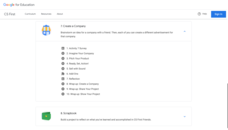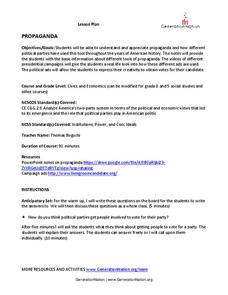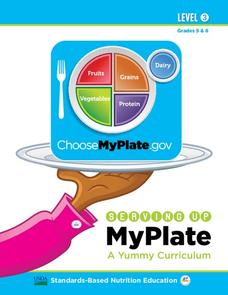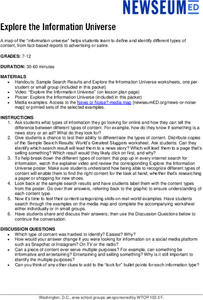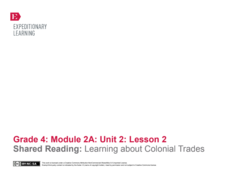Media Education Lab
Sponsored Content as Propaganda
What is sponsored content? Who produces sponsored content? Why? Is it fair or unfair? What are the privacy implications for consumers? To answer these questions, class members view a model screencast before crafting their own that...
School Improvement in Maryland
Evaluating Political Advertisements
How do interest groups try to influence elections? As part of their study of the election process, groups view 30-second advertisements produced by advocacy groups and use the provided worksheet to evaluate these ads. They then craft...
Museum of the Moving Image
AdMaker, Obama vs. McCain, “Fundamentals” (2008)
Truth is often left on the cutting room floor when political ads are produced. After viewing the 2012 backfire ad, "Fundamentals" that takes John McCain's comments on the US economy out of context, class groups edit the audio and video...
Museum of the Moving Image
Evaluating Information: Focus on the 2008 Election
Just how true is the information contained in political ads? Determining the veracity of campaign ads from the 2008 presidential race is the focus of a activity that introduces class members to several fact-checking resources.
Centers for Disease Control and Prevention
Youths Are Exposed to E-Cigarette Advertisements from Multiple Sources
The use of tobacco and alcohol use among young people is increasing. Vaping in particular, is gaining popularity with middle and high school students. A colorful infographic details the top four sources of advertising accessed by young...
Mikva Challenge
Deconstructing Campaign Messages and Perceptions
Target audience, covert message, explicit and implicit appeals. As part of an investigation of rhetorical devices used in campaign ads, class members examine and deconstruct the appeals in logos from the 2008 election. They then use the...
Texas Education Agency (TEA)
Advertising, Special Events and Promotion
What a bargain! Scholars learn how to increase business profits with special events and promotions. Using what they learned, pupils create a special event for their school and give an oral presentation to explain their promotional...
Media Education Lab
Understanding Viral Messages
Imagine advertising for a product but not being paid to do so. Welcome to the world of Viral Messaging. Class members first view a T-Mobile flash mob video that went viral and has been seen by over 14 million viewers. After analyzing the...
Scholastic
Presenting Persuasively (Grades 6-8)
Teens and pre-teens are a prime target for advertisers, so how are they doing it? An interactive activity highlights the strategies used by advertisers, such as visual imagery and verbal clues. Then, a short writing assignment puts those...
Media Smarts
Selling Obesity
Learners examine health issues that are associated with our fast food culture, and the advertising of it. They begin with a snack-food survey to assess their own eating habits. Pupils are encouraged to think critically throughout the...
Institute for Humane Education
In Your Face: Reclaiming Billboards
Ads here, ads there, ads everywhere—but what do they communicate? Pupils discuss this topic and develop a list of personal values. They then work as creative directors at an advertising firm to create billboards that reflect community...
Google
Friends: Create a Company
Create a company, advertise it, and hope it grows. The seventh of eight parts in the Google CS First Friends unit challenges future business leaders to apply computer coding to create an advertisement for a company. After pairs come up...
Crabtree Publishing
Why Does Media Literacy Matter?
Criticism of news and entertainment journalism is at an all-time high. Help 21st-century learners develop the media literacy skills they need to become critical consumers with a three-lesson guide the looks at persuasive techniques used...
Generation Nation
Propaganda
How does propaganda influence our vote? Through grand conversation, scholars gain information about what is and how to identify the different ways propaganda is used in a presidential election. Using their new-found knowledge, citizens...
University of Wisconsin
Analyzing Presidential Campaign Propaganda
Campaign propaganda has evolved from 1952 through the presidential election of 2008. A social studies activity prompts class members to analyze the devices used in ads and political cartoons, noting strategies they believe would work to...
US Surgeon General
Get the Facts on E-Cigarettes
Imagine these flavors: chocolate, candy, menthol. What age group do you imagine is the target audience of an advertising campaign that features a product with these flavors? Find out the facts about vaping with a resource that provides...
US Department of Agriculture
Serving Up My Plate
Within three nutrition-themed, inquiry-based learning opportunities, pupils take notice of their eating habits; delve deep into the five food groups, gain experience in planning meals, participate in a taste test, and explore ads from...
iCivics
Step 9: Grab People’s Attention
Attention! Attention! Scholars investigate the concept of attention-grabbers in advertising a product or a cause. They use the ninth installment of a 10-part County Solutions - High School series to analyze t-shirts, bumper stickers,...
Institute for Humane Education
Selling "Boy" and "Girl"
Monster trucks, action figures, and video games. Are these toys designed for boys or girls? Scholars work in small groups to find and categorize examples of boy and girl toys from catalogs. Next, learners analyze the two sets of pictures...
EngageNY
Planning the Performance Task
Class members work in pairs and use an Ad Analysis planning guide to begin planning their final tasks. After sharing ideas with their partners, learners begin working on their final products.
Nemours KidsHealth
Alcohol: Grades 9-12
Two activities ask high schoolers to consider the role of alcohol culture in their lives. First, groups analyze the types of appeals used in newspaper ads for alcoholic drinks and compare those images with what they have observed....
Newseum
Explore the Information Universe
Distinguishing among different types of content when conducting online searches can be a challenge. An informative resource helps researchers identify different types of content, from fact-based reports to ads, from propaganda to satire....
Crafting Freedom
Creating Original Historical Fiction Using Henry "Box" Brown's Narrative and Runaway Slave Ads
Young historians discover the experiences of runaway slaves after reading the brief biography and narrative excerpt of Henry "Box" Brown, who escaped slavery by having himself shipped away in a crate and popularized his flight in a...
EngageNY
Shared Reading: Learning About Colonial Trades
Trading in Colonial America is the focus of a lesson plan that boosts reading skills. As a class, scholars examine the informational text for crucial details, use their newfound knowledge to share information with their peers, and write...
Other popular searches
- Advertising Campaign
- Alcohol Advertising
- Advertising Slogans
- Advertising of the 1920s
- Advertising and Marketing
- Food Advertising
- Commercial Advertising
- Drug Advertising
- Tobacco Advertising
- Consumers and Advertising
- Health Advertising
- Advertising Flier













